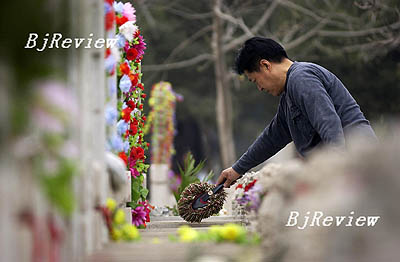|

"See that shop we just passed with the traditional silk clothes on those mannequins? Such shops only sew outfits for dead people. I bet you don't do that in the West," commented Mr. Yang, my erstwhile colleague. We were riding our bikes around the city after teaching a special course together.
"Well, we spend huge sums to embalm people, make them look like they're still alive and in the peak of health. We do dress our dead up well, but I doubt anyone orders special suits from exclusive shops for the journey to the netherworld. Do you believe in any afterlife or have a religion, Yang?" I asked, craning my head to look at him. With true Confucian rectitude he'd never discussed death or religion with me before.
"Chairman Mao Zedong was my god; you know that," he said. "So when I die I guess I'm going to hell because I believe in nothing at all anymore."
"Not even a little Buddhism? I thought most Chinese were Buddhists," I said, inspecting his face. My friend looked tired and pale. "Are you all right?"
"Just a cold, nothing serious," Yang replied. "My father died of lung cancer, that's why I refuse to smoke. My mother adopted some Christian beliefs after he died, but I think she was just looking for comfort and boredom relief. She still has a small Buddhist altar in her room, with a wooden Christian cross hanging above it. Kill many birds with one rock, correct?" He coughed softly and said. "But I really have lived my 50 years with no faith, no faith at all, if you disregard the Communist slogans I grew up. But as a good Chinese I honor and respect my ancestors."
"Do Chinese have holidays for their dead ancestors?" I countered, changing the subject.
"Yes, we have the Tomb Sweeping Day, when we show respect to ancestors by cleaning their grave sites, and the informal Ghost Day, when we burn paper money to send to them, and also the anniversary of the death day we send money and gifts to our dead by burning them also," he explained. "Even the dead have need for money, and delicious food, clothes, and, of course, love " He grinned widely.
"Chinese really believe in the afterlife?" I asked my friend.
"Yes, especially in the countryside. Rural Chinese feel that a human being has two souls: the first is gui: this is the soul (or ghost/spirit)--it is considered to be part of the nature of the element yin; during life inside the body it is known as po. After a person dies the spirit lives on beside the body in the grave. According to legend jade, gold, pearls, and shells protect it from decay, thus keeping the two eternally united," he replied.
My friend coughed and continued, "It's complicated: the other soul is the shen--it is made up of the element yang. When shen resides in the living body it is called qi--that literally means breath or life force. When the qi leaves the body it becomes a wandering spirit called ming. Meanwhile the shen, after a person dies, can also live in the grave or around the gravestone for a while, but it eventually rises on wings and heads to a sky paradise, the ‘Islands of the Blessed'."
"Dying sure is a big deal in China," I remarked politely.
"Living is better," Yang answered. "Let's go eat!" |